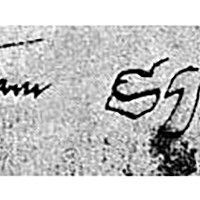
Before and after images of the Shakespeare funerary monument in Holy Trinity Church, Stratford-upon-Avon, which originally showed him with a sack of wool on his lap. After "restoration" in 1748, he was given a pen and the sack reduced to a writing surface. No mention is made of him as a great writer in the ambiguous text below.
[
{
"name": "Top Stories Video Pair",
"insertPoint": "7",
"component": "17087298",
"parentWrapperClass": "fdn-ads-inline-content-block",
"requiredCountToDisplay": "1"
}
]
On April 26, 1564, 460 years ago, the baptism of one "William Shakspere" was recorded in the provincial town of Stratford-upon-Avon in Warwickshire, England. According to the conventional story, this glover's son grew up to become the greatest writer in the English language, author of 38 plays, 154 sonnets and three long poems. But was Stratford's "Shakspere" the "Shakespeare" (or "Shakes-peare") whose name appears on the title pages of these works? Or, as seems increasingly likely, was the Shakespeare canon written by someone else while Shakspere, wool merchant and sometime actor, had nothing to do with it? Like many before me, I believe the Stratfordian case — that the Stratford man and the writer were one and the same — is so flawed as to be unbelievable.
The anti-Stratfordian position started out as a series of nudge-nudge-wink-wink hints in the early 17th century, implying the name on the printed title pages was the pseudonym of someone who needed to remain anonymous, and has only strengthened over the years. Despite this, orthodox biographies of Shakespeare appear about once a year, perhaps because writers who identify the Stratford man with the great writer have it easy: With so few hard facts about his life, they can make up any tale they want. And they do! For instance, Stephen Greenblatt's 2004 bestseller Will in the World (which begins, "Let us imagine ..." and continues in the same vein) was panned as "biographical fiction."
Anti-Stratfordians claim that the immortal Shakespeare we know and love was probably not the tax-dodging businessman from a provincial town who could barely sign his own name; nor the father who made no effort to educate his daughters, regardless of many intelligent and well-read female characters in the plays; nor the 52-year-old man who died un-mourned and unnoticed, despite — supposedly — being the most famous playwright of his time; nor the puffy-faced guy whose bust in his local parish church originally showed him as a wool merchant (the wool sack he was holding replaced years later with writing surface for a quill pen); nor the cultured genius who was able to read and write in French, Italian and Greek, and who possessed an intimate knowledge of Northern Italy and France.
I say "probably" since, as far as the majority of Shakespearean scholars are concerned, all the above can be explained away, and anyone who doubts that the Stratford man couldn't have penned the works attributed to William Shakespeare must be ill-informed, deluded or, as one scholar had it, immoral. Shakespeare is, after all, an institution, and "bardolatry" a thriving business, perhaps England's greatest export. As such, it's the saga of a young man coming from a poor, illiterate family who mysteriously morphed into the writer of works "dazzling in their erudition, steeped in the learning of Renaissance humanism," to quote Elizabeth Winkler's Shakespeare Was a Woman and Other Heresies. This rags-to-riches story wasn't unprecedented. Christopher Marlowe came from similar circumstances but, unlike Shakspeare, we know his genius was recognized early and that he attended Cambridge University on a scholarship. You can be born a genius but knowledge has to be acquired.
Next week, I'll look at some of problems with reconciling the man from Stratford with Shakespeare the author.
more from the author
-
Doubting Shakespeare, Part 2: Problems
- May 2, 2024
-
A Brief History of Dildos
- Apr 11, 2024
-
Eclipse!
- Mar 28, 2024
- More »
Latest in Field Notes
Readers also liked…
-
Trouble on the Line: The Reality Part 2
- Nov 3, 2022

































